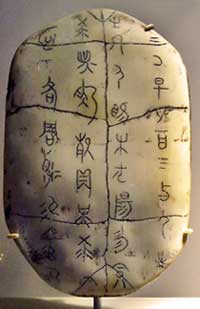The Zhou Dynasty was the first dynasty to unite most of China under a single government. It helped lay the foundation for the unification of China by the subsequent Qin Dynasty (221-206 BC). During the Zhou Dynasty, farming techniques improved, iron became widely utilized for tools and weapons, and Confucianism and Taoism became the prevailing philosophies of moral conduct.
 The Zhou People were a semi-nomadic clan from the northwestern part of China. They rose against and defeated the Shang Dynasty, and established the capital at Hao, near modern Xi'an. From a social point of view, the Zhou was quite similar to the Shang. The rulers were nobles who practiced ancestor worship. Divination marked every important decision or event. Peasants were physically separated from other classes, but were a key element. They carried out vital and supportive functions such as sowing and reaping.
The Zhou People were a semi-nomadic clan from the northwestern part of China. They rose against and defeated the Shang Dynasty, and established the capital at Hao, near modern Xi'an. From a social point of view, the Zhou was quite similar to the Shang. The rulers were nobles who practiced ancestor worship. Divination marked every important decision or event. Peasants were physically separated from other classes, but were a key element. They carried out vital and supportive functions such as sowing and reaping.
Western Zhou (1045 -771 BC)
During the Western Zhou Dynasty people honored family relationships and stressed social status distinctions. The early Western Kings did not attempt to exert direct control over the entire territory they had conquered. They secured their position by selecting loyal supporters and relatives to rule walled towns and the surrounding territories. Each of these local rulers was generally able to pass his position on to a son, so that in time the domain became a hereditary vassal state. Within each state, there were noble houses holding hereditary titles. The rulers of the states and the members of the nobility were linked to one another and to their ancestors by bonds of obligation based on kinship. Below the nobility were the officers and the peasants, both of which were also hereditary statuses. The relationship between each level and its superiors was conceived as a moral one. Peasants served their superiors, and their superiors looked after the peasants' welfare. Social interaction at the upper levels was governed by a set of complex rules of social etiquette and personal conduct. Those who practiced proper rules were considered civilized; those who did not, such as those outside the Zhou territory, were considered barbarians.
The Zhou kings maintained control for more than two centuries. But in 770 BC several powerful states allied with a nomadic people rebelled and forced the Zhou to move from their capital near Xian to present day Luoyang, east of the previous capital. This marked the beginning of the Eastern Zhou Dynasty
Eastern Zhou (770-256 BC)
Eastern Zhou kings no longer exercised much political or military authority over the states they had once ruled. The political structure of the Eastern Zhou was more like a confederation with the Zhou kings remaining nominal overlords. During the Eastern Zhou period, social and economic achievement was notable. The implementation of iron-tipped, ox-drawn plows and improved irrigation techniques marked great advances in agriculture. The steady social productivity supported a steadily increasing population. Other economic achievements included the circulation of coins for money and the growth of cities. Military technology also advanced. The Eastern Zhou developed the crossbow and learned cavalry warfare from nomads.
There were two major subdivisions in the Eastern Zhou period: the Spring & Autumn, and the Warring States. During the 7th and 6th centuries BC, brief periods of stability were achieved through alliances among states, under the domination of the strongest member. Traditionally this period has been regarded as the Spring & Autumn period. During this time, the Zhou emperor steadily lost power due to the realization by the feudal lords that he was not powerful and could be beaten.
The years from 475 to 221 BC were known as the Warring States Period., a time of intensified warfare that lasted from about 475 to 221 B.C. This time period of the Warring States is considered to be the classical age, it was a time of great philosophers. This cultural flowering is sometimes called the One Hundred Schools Period. Some of the most memorable poetry and prose were also written during this time. Other advances included the recording of the law, an increase in market places, and a money economy. The development of iron, and tools made of iron, greatly increased agriculture and the population exploded.

